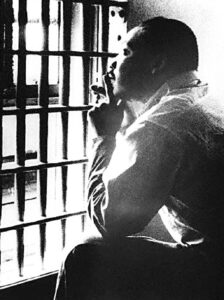Tension in the Name of Justice
Dr. Martin Luther King Jr. argued for the necessity of direct action through non-violence in his 1963 “Letter from a Birmingham Jail.” In this excerpt, King addresses the “moderate” belief at the time that supposedly agreed with change but only when combined with order and negotiation. King acknowledged the importance of negotiation but tied the concept to the need for tension. He argued that “constructive, non-violent tension” was required. King suggested that this phenomenon was not new, that Socrates felt such tension was required for personal growth and ultimate truth. In his view, King thought this dynamic was necessary for communities where brotherhood should rise above prejudice.
The emphasis on tension here was about timing. King held that freedom has never been offered voluntarily by the oppressor in his letter, highlighting the relevance of this throughout American history from the fight for abolition to that for civil rights. In this struggle, according to King, the word “wait” always denied justice by delaying it too long. Then the young Baptist minister (King was only 34 years old at the time) made some “confessions” to his “Christian and Jewish brothers,” explaining that his frustration was deeper with white moderates than blatant racists. That confession may have seemed counter-productive to some, but King realized that those simply not agreeing with his methods of direct action presented the real roadblock. The desire of these moderates to have law and order while waiting endlessly for justice was killing civil rights.
These words have only become more relevant in the fight for justice throughout the world today. For instance, the topic of “law and order” emerged during the 2020 presidential campaign in response to Black Lives Matter protests. The King who wrote from Birmingham would have surely argued with Trump –and perhaps even Biden– over their various calls for calm and order in response to the agitation and occasional violence. King certainly believed in non-violence, but I wonder if he would have considered establishment Democrats like Biden as being too representative of the “moderate” instinct. Perhaps King for this reason would have held them responsible at times for enabling racial injustice.
By Nick Rickert, June 2021

